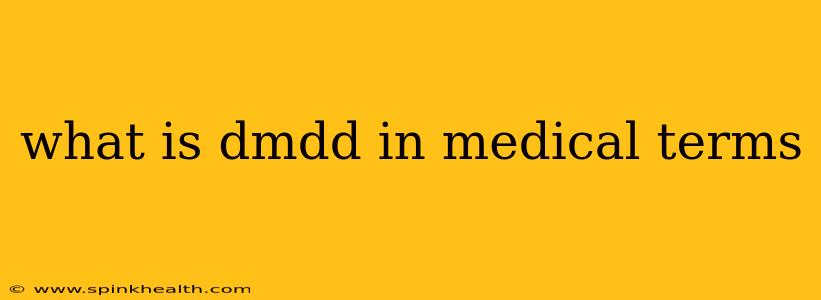Disruptive mood dysregulation disorder (DMDD) might sound like a mouthful, but understanding this relatively new diagnosis is crucial for parents, educators, and healthcare professionals alike. It’s a condition that affects children and adolescents, characterized by persistent irritability and frequent, intense temper outbursts. Let's delve deeper into this often misunderstood condition.
My journey into understanding DMDD began several years ago when a close friend’s child was diagnosed. Witnessing their struggles firsthand ignited my passion to learn more about this challenging disorder. I've since spoken with numerous psychologists, psychiatrists, and parents, and this article reflects my research and experiences.
What are the main characteristics of DMDD?
DMDD isn't simply a child having a bad day or a "spirited" personality. It's a significantly more intense and persistent pattern of irritability and anger. The core features include:
- Severe and recurrent temper outbursts: These outbursts are grossly out of proportion to the situation or provocation. Think screaming, yelling, throwing things – behaviors far exceeding what’s typically expected for a child's developmental stage.
- Chronic, persistent irritability: This isn't just occasional grumpiness. It's a pervasive state of negative affect, with the child being easily angered and often displaying a grumpy or sullen demeanor.
- Frequency and intensity: The outbursts must occur frequently (at least three times a week) and be intense enough to cause significant distress or impairment in various areas of life, including school, social relationships, and family life.
- Age of onset: Symptoms typically begin before age 10 and are present for at least a year.
- Absence of manic or hypomanic episodes: This is a crucial differentiator from other mood disorders like bipolar disorder.
How is DMDD diagnosed?
Diagnosis requires a thorough evaluation by a mental health professional, typically a child psychiatrist or psychologist. They'll consider the child's history, conduct observations, and possibly use standardized rating scales to assess symptoms. There's no single test for DMDD; diagnosis relies on a clinical judgment based on observed behavior and reported experiences.
What is the difference between DMDD and other conditions?
This is a key question, often confusing parents and professionals alike. DMDD is often confused with other conditions, including:
Oppositional Defiant Disorder (ODD):
ODD involves a pattern of negativistic, defiant, and hostile behavior. While ODD can involve irritability, it doesn't typically include the severe, recurrent temper outbursts characteristic of DMDD.
Bipolar Disorder:
Bipolar disorder involves periods of mania or hypomania (elevated mood and energy) interspersed with depressive episodes. DMDD specifically excludes these manic or hypomanic episodes. Children with DMDD may experience intense irritability, but it doesn't cycle into the distinct phases seen in bipolar disorder.
ADHD:
Attention-deficit/hyperactivity disorder (ADHD) shares some overlapping symptoms, particularly impulsivity. However, ADHD doesn't typically involve the same level of persistent irritability and severe temper outbursts seen in DMDD. A child can, however, have both ADHD and DMDD.
What are the treatments for DMDD?
Treatment for DMDD usually involves a multi-pronged approach:
- Therapy: Cognitive behavioral therapy (CBT) and parent training are commonly used. CBT helps children learn to manage their emotions and behaviors, while parent training equips parents with strategies to respond effectively to their child's outbursts.
- Medication: While medication is not always necessary, in some cases, certain medications like mood stabilizers or antidepressants might be considered to help manage irritability and improve mood. This decision should be made in close consultation with a psychiatrist.
What is the prognosis for children with DMDD?
The prognosis for DMDD varies depending on several factors, including the severity of symptoms and the effectiveness of treatment. Early intervention and consistent treatment are vital for improving outcomes. Many children show improvement with appropriate support, but some may continue to experience challenges into adulthood.
This condition is complex, and understanding its nuances is crucial for effective management. If you suspect your child might have DMDD, seek professional help for a proper diagnosis and personalized treatment plan. Remember, you're not alone in this journey, and support is available.

